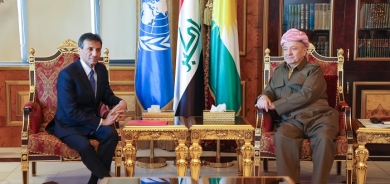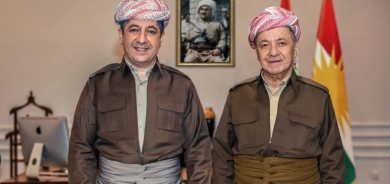PM Masrour Barzani Speech: Atlantic Council Global Energy Forum, Dubai

Prime Minister Masrour Barzani delivered a keynote address today at the Atlantic Council Global Energy Forum in conjunction with the World Government Summit about energy development, exports, and the future of the Kurdistan Region of Iraq.
“Ministers, Distinguished guests, ladies and gentlemen
Salam o Alikum
I'm honoured to be with you all today to talk about the future energy potential of the Kurdistan Region of Iraq. I carry with me the good wishes and aspirations of my people.
I take particular pleasure in giving this address from a place in which the forebears of many of you here had an extraordinary vision to build a state that would provide for its citizens, and act as a beacon to the world.
Fifty years later, the UAE has achieved both. Your country is a powerhouse of our region whose leadership has wisely harnessed the natural resources and the abundant talent of its people.
At each step of your journey, sustainable use of energy has been forthright. No other country in the world has been as effective in making energy a nation building pillar.
I want to begin by thanking UAE Energy Minister HE Suhail Mohamed Al Mazrouei and Atlantic Council President and CEO, Frederick Kempe, for the invite to this timely summit. And to the organizers for making this event possible, and bringing us together. I look forward to hearing your views and questions.
I stand before you today at the culmination of a week-long visit to the Emirates. I am here - the second time in less than a month, to foster a serious relationship with the United Arab Emirates and to learn from you. At each step of my visit, I have had highly informative discussions with leaders and elders.
It is clear to me that we share a common vision. We are drawn together by a shared set of values. We protect and serve our people, while at the same time offering sanctuaries to others. We are also outward facing proud members of the global community who are determined to provide for better futures.
Throughout these past years, we in Kurdistan have watched and learned from your experience in the UAE as we have navigated a series of obstacles.
And our story is a hopeful one. We have gone from almost a standing start when we passed our oil investment law 15 years ago to a region that produces and exports around half a million barrels of oil per day and also produces almost half a billion cubic feet of gas per day, with the potential to grow both of these further. But this hasn’t been an easy journey.
Sectarian tensions in parts of the country, the rise and fall of the Daesh terror group, which we played a lead role in defeating, political uncertainty in Iraq, and lately a grave injustice inflicted on us by a so-called 'federal court’ judgement have all taken a toll. But we as a people have prevailed. And it is my vision that we will go on to prosper.
Efficiently and wisely harnessing our energy capacities have been central to our future. And, my government has made doing just that a strategic priority, which I believe will sustain Kurdistan in perpetuity. Our future will be built on energy, both that of our people, who have earned their time to shine and through the sustainable development of a natural resource that we as Kurds have been working towards through decades of war, pestilence, insurrection and other impositions.
We have now reached a point in our history where we stand ready to build on all our sacrifices. We have a tremendous opportunity to provide for both our domestic and global markets, and we are determined to transform Kurdistan into an energy hub of our region.
So what are we doing about it? My government's energy strategy is based on two pillars.
My first responsibility is to meet the growing demand and aspiration of my people. In the decades since the inception of Kurdistan, demand for energy has soared. Families have bought more cars and houses; public services have penetrated deep into the countryside; and for the first time our capital, Erbil, is en route to becoming a regional hub for business and investment.
The last three years have been transformational for us. We have implemented global best practice policies in parts of our public sector, and have taken measures to ensure that the blight of all reform programs, inertia, is kept at bay.
We have slashed red tape in order to drive a private sector. We are encouraging entrepreneurship and rewarding creative thinking.
We have digitalised part parts of our public interface with institutions, a move that has slashed opportunities for inefficiencies and corruption. We are implementing reforms and tax reforms that will remove needless obstacles for investment and innovation.
Growth is an essential path to our destination. My government has announced several major economic and industrial zones. But we have a long way to go, and even as we expand our capacity, we are being held back by our inability to meet the energy needs of some of our local authorities and partners. Demand for gas, for instance, is already more than double current production rates.
This is not a situation we want to be in, and it is one we are taking urgent steps to address. Recently, the United States has recognized the potential in our gas sector and have partially financed efforts to increase production. I know some of our partners here today have already been in talks with my government, and local authorities to help bridge other temporary gaps.
We continue to invest in more power plants and renewables to power our future. And at the same time, we continue to develop an export potential, I'm confident that Kurdistan will soon become an important source of energy for the world's growing demand. We will become a net
exporter of gas to the rest of Iraq, Turkey and Europe in the near future, and help meet their energy security needs. Already, we have an export oil capacity, which acts as an essential economic lifeline for us and a vital potential supply for our partners. We have significant untapped reserves of both oil and gas in our region.
I've also had talks with the federal government of Iraq, Turkey, and the Gulf countries about a regional railway network. I believe that this could be transformational for Iraq and the region, creating new trade routes and another window for regional cooperation.
To meet this agenda, we will need help; the support of our friends, many of whom are in this room today, and the courage of our partners to overcome their inhibitions. A strong, economically independent Kurdistan is no threat to its neighbors, or to our partners in Baghdad. In fact, it is the opposite.
We have demonstrated time and again our strength of purpose and our loyalty to our friends. We are a people of our word. If we act as a united front, the challenges that affect us all can be mitigated. We can and will help countries of our region and beyond meet their energy needs, as well as consolidating our own society.
As we continue to develop our oil and gas potential, we will retain a focus on renewables. The shift towards renewable energy is both a noble cause and an economic necessity. Renewable energy costs have fallen year-on-year; governments have increasingly encouraged, and in some cases finance the pivot to renewables.
But I also remember well that over a decade ago analysts warned that oil- dependent states and governments would be condemned to economic free fall lest they pivot to renewables; that it was now or never to wean off oil and gas. They even had a name for it; the end of the
fossil fuel era.
And yet today, a conflict on the European continent has exposed the fallacy of that prediction. I should make it clear in this forum that we in Kurdistan have the capacity now to make up for at least some of the shortfall of oil in Europe, if our partners in Baghdad are prepared to work with us.
So today I want to be realistic about our needs and cautious in our assessments. I have no doubt that oil and gas will remain an essential part of the energy mix for the foreseeable future. And though I recognize that we will inevitably wean off dependence as an exclusive source of revenue and growth, it will not happen overnight.
That aside, my cabinet has been taking constructive steps to diversify our economy, in a way that gives us a buffer against the uncertainty of global energy prices. We're drafting legislation for new industries and creating a regulatory environment to incentivize local companies and authorities, and to create competition.
This diversification - focused principally on agriculture, manufacturing and services sectors will be in addition to our energy sector -- not an alternative. At the same time, we are taking tangible steps to improve the efficiency of our energy sector. We, and much of the world, need to get smarter about how we use oil and gas.
Last year we issued a directive to all oil companies operating in the Kurdistan region to end gas flaring. I know many of the CEOs are here today, and I thank them for their leadership and commitment to protect local communities and the environment for future generations.
We've already opened our first plant that now captures flared gas, helping much needed electricity to local communities.
We've announced small solar-based investments. And I was especially pleased recently to see big Kurdistan companies invest in solar farms in remote villages. In hydroelectric, we're investing in small and big dams.
These projects signal our determination towards a greener future but also the recognition of the growing energy demand.
Our two benchmark energy policies; more efficient use of existing oil and gas resources and development of renewables, are great opportunities for international investors. My government is keen to welcome investors who can bring expertise as well as finance and
who are looking for a long-term relationship.
Before I end, I know there are many friends and partners from the oil and gas sector in Kurdistan. And I know that no pitch would be complete without assurances to you.
I would like to reiterate to you all that my government remains committed to the contracts that have been signed between us. The contracts are in line with our oil and gas law and the Iraqi Constitution and they are a bedrock of our shared future. The sanctity of the contracts are just as important to my government as they are to you. These have been reaffirmed by world-leading legal experts and international courts. We continue to do all in our power to protect them.
Investors in Kurdistan have the right to receive regular payments. Ensuring this happens is a core focus of my cabinet, which will clearly help secure future investment. We value the investment and partnership of all the energy companies who are in Kurdistan - I know you have maintained commitment through the challenges.
That's why economic diversification is crucial - to also help us in government provide certainty in cash-flow to our investors and IOCs.
We in Kurdistan have long sought mechanisms for the federal distribution of oil and gas revenues across all of Iraq. That's what the Constitution calls for, and the only practical way forward for both Baghdad and us.
I want to make one thing very clear about a recent ruling by a so-called Supreme Court in Baghdad, which challenged our right to develop our oil industry. This ruling is unconstitutional and blatantly political. It does not pass the most basic of tests and it has been made to pressure us in the delayed government formation process following federal elections last October. Our friends and partners can see straight through this.
We are negotiating with our partners in the federal government for an agreement that respects the Constitutions and our rights in it. This has always been our position. And as I have told Iraqi Prime Minister Mustafa Kadhimi, we want to help the rest of Iraq - from Mosul to Basra, to prosper too; it doesn’t have to always be a zero-sum game; it can be truly a win-win.
I often remind our friends in Baghdad that Kurdistan already provides electricity to other parts of Iraq. It has the ability to further support the country’s energy needs. We remain committed to playing a constructive role for all of Iraq.
But I want to assure each and every one of you, and our investors, that this ruling does not represent a real challenge to our investment potential. We are open for business, and we very much look forward to welcoming new partners to Kurdistan.
In closing, I offer you, honorable friends and colleagues, a hand of true friendship. At the start of my address to you all, I spoke about your country being a beacon to the world. What I didn't say then is that your achievements have also been a personal example of how a country and a society can work.
You have set the bar high for our region and beyond. You have offered us a lot to emulate. As we continue to build Kurdistan, we will draw lessons from modern history's most successful nation builders. We are proud to call you partners and friends, and we look forward to welcoming you to our homeland, just as warmly as you have accepted us into yours.
Thank you all, and God Bless you all.”














